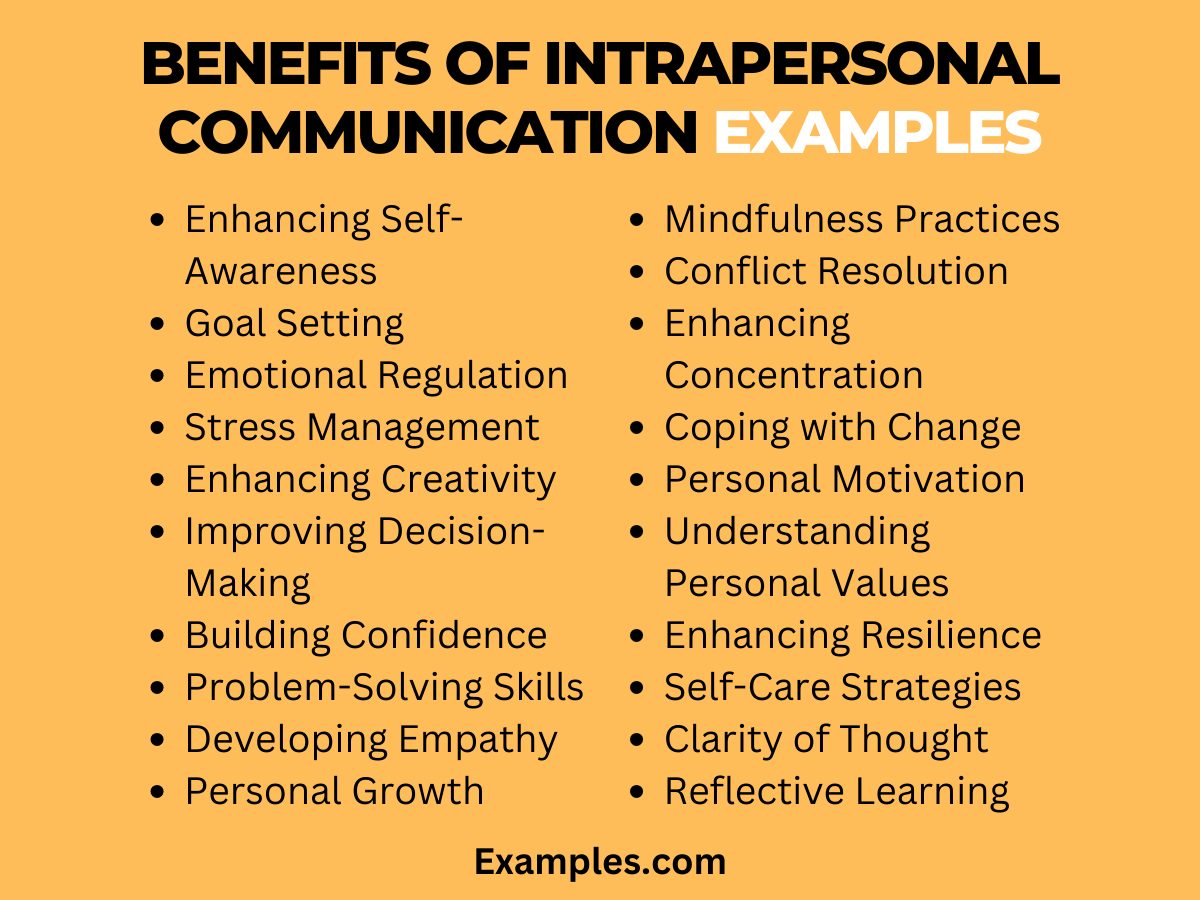Uses & Benefits of Intrapersonal Communication
Intrapersonal communication is a vital yet often underrated component of personal development and effective decision-making. This comprehensive guide illuminates the numerous uses and benefits of intrapersonal communication, contrasting them with Intrapersonal Communication Examples to underscore its significance. Through real-life scenarios and practical examples, we delve into how mastering this skill can lead to improved self-awareness, emotional health, and overall well-being. Embrace the journey towards a more introspective and empowered self.
What are the Benefits of Interpersonal Communication?

Interpersonal communication is the exchange of thoughts, feelings, and messages between two or more people. It’s a key element in building relationships and understanding others. This type of communication can be verbal, using words, or non-verbal, like gestures and facial expressions. Effective interpersonal communication fosters meaningful connections and promotes teamwork and collaboration. It’s essential in various settings, from personal relationships to professional environments. Understanding and refining these skills can lead to enhanced empathy, conflict resolution, and overall social interaction.
20 Benefits of Intrapersonal Communication Examples

Intrapersonal communication, the art of conversing with oneself, is pivotal in personal growth and emotional well-being. This skill encompasses self-reflection, problem-solving, and understanding of one’s emotions and desires. Mastering intrapersonal communication leads to better decision-making, heightened self-awareness, and improved mental health. Below are 30 unique examples, each with a detailed explanation and example sentences, showcasing the transformative impact of intrapersonal communication in personal and professional life.
- Enhancing Self-Awareness: Recognizing personal strengths and weaknesses through self-reflection.
Example: “What are my core values and how do they influence my decisions?” - Goal Setting: Defining personal and professional goals clearly.
Example: “What are my objectives for this year, and what steps will I take to achieve them?” - Emotional Regulation: Managing emotions effectively.
Example: “Why do I feel anxious about this situation, and how can I address it?” - Stress Management: Using self-talk to alleviate stress.
Example: “This is challenging, but I can handle it by breaking it down into smaller tasks.” - Enhancing Creativity: Allowing space for creative thoughts and ideas.
Example: “Let’s brainstorm different ways to approach this project.” - Improving Decision-Making: Weighing options and consequences internally.
Example: “What are the pros and cons of each choice I have?” - Building Confidence: Affirming personal abilities and strengths.
Example: “I am skilled and capable of handling this task.” - Problem-Solving Skills: Analyzing situations to find solutions.
Example: “What strategies can I use to overcome this obstacle?” - Developing Empathy: Understanding personal emotions to relate to others.
Example: “How would I feel in their situation?” - Personal Growth: Assessing and improving oneself continuously.
Example: “How have I grown from my past experiences?”
- Mindfulness Practices: Being present and aware of current thoughts and feelings.
Example: “What am I feeling right now, and why?” - Conflict Resolution: Identifying and addressing internal conflicts.
Example: “Why am I conflicted about this decision, and how can I resolve it?” - Enhancing Concentration: Focusing thoughts on specific tasks or goals.
Example: “Let me concentrate on this task and block out distractions.” - Coping with Change: Adapting to new situations through self-guidance.
Example: “Change is part of life; how can I adjust to this new scenario?” - Personal Motivation: Encouraging oneself to pursue goals and tasks.
Example: “I have the ability to complete this project successfully.” - Understanding Personal Values: Identifying what truly matters on a personal level.
Example: “What values are most important to me, and how do they guide my actions?” - Enhancing Resilience: Building inner strength to overcome challenges.
Example: “I have faced challenges before and emerged stronger.” - Self-Care Strategies: Recognizing the need for and taking actions towards self-care.
Example: “I need to take a break to recharge my energy.” - Clarity of Thought: Developing clear and focused thinking.
Example: “Let’s clarify the main points before proceeding further.” - Reflective Learning: Analyzing past experiences for learning and growth.
Example: “What did I learn from that experience, and how can I use it in the future?”

These examples underscore the importance of intrapersonal communication in fostering a well-balanced, introspective, and self-aware life, beneficial in both personal and professional realms.
In conclusion, the Uses & Benefits of Intrapersonal Communication are immense, impacting both personal and professional spheres. This guide, enriched with practical tips and examples, underscores the significance of nurturing a dialogue with oneself. Embracing intrapersonal communication fosters self-awareness, emotional intelligence, and decision-making skills, paving the way for a more fulfilled and introspective life journey.



